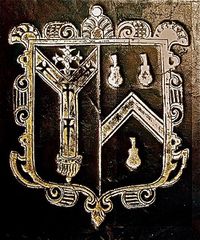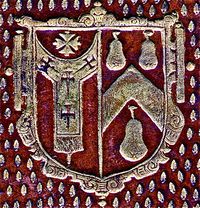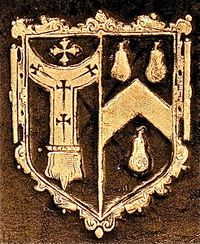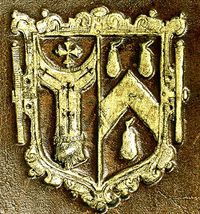Difference between revisions of "George Abbot 1562-1633"
(→Books) |
|||
| (16 intermediate revisions by 2 users not shown) | |||
| Line 1: | Line 1: | ||
| − | ===[[name::George]] [[name::ABBOT]] [[date of | + | __NOTITLE__===[[name::George]] [[name::ABBOT]] [[date of birth::1562]]-[[date of death::1633]]===__NOTITLE__ |
| − | + | [[File:AbbotGeorge1.jpg| thumb | 200px | Armorial Stamp of George Abbot (British Armorial Bindings)]] | |
| + | [[File:AbbotGeorge2.jpg| thumb | 200px | Armorial Stamp of George Abbot (British Armorial Bindings)]] | ||
| + | [[File:AbbotGeorge3.jpg| thumb | 200px | Armorial Stamp of George Abbot (British Armorial Bindings)]] | ||
| + | [[File:AbbotGeorge4.jpg| thumb | 200px | Armorial Stamp of George Abbot (British Armorial Bindings)]] | ||
====Biographical Note==== | ====Biographical Note==== | ||
| − | Born at [[place of | + | Born at [[place of birth::Guildford]]; B.A. [[education::Balliol College, Oxford|Balliol]] 1582, [[occupation::fellow]] 1583, M.A. 1585, B.D. 1593, D.D. 1597. [[occupation::Master]] of [[organisations::University College, Oxford|University College]], 1597-1610; [[occupation::dean|Dean]] of [[organisations::Winchester Cathedral|Winchester]] 1606; [[occupation::bishop|Bishop]] of [[diocese::Lichfield]] and [[diocese::Coventry]] 1609; of [[diocese::London]], 1610; [[occupation::Archbishop]] of [[diocese::Canterbury]], 1611-33. A mixture of hard work, scholarly and political ability, and influential patronage ensured the steady advancement of Abbot’s career and good standing in the eyes of [[associates::James I]]. His archiepiscopate was a troubled one as he became an isolated figure whose Calvinist leanings were increasingly out of tune with the court and the Laudian wing of the Church. His last decade was further blighted by the accidental killing of a gamekeeper in 1621, while out hunting. |
====Books==== | ====Books==== | ||
| − | Abbot inherited, at [[organisations::Lambeth Palace|Lambeth]], one of the largest library collections of the time, more than 6000 volumes left by his predecessor [[ | + | Abbot inherited, at [[organisations::Lambeth Palace|Lambeth]], one of the largest library collections of the time, more than 6000 volumes left by his predecessor [[crossreference::Richard Bancroft 1544-1610|Bancroft]], to which he [[bequest::bequeathed]] a further 2670 volumes. Abbot acquired and valued books throughout his career; he organised the cataloguing of the [[organisations::Lambeth Palace |Lambeth]] collection, and during his lifetime he [[bequest::gave]] books or money to buy them to [[beneficiary::St Andrews University]], [[beneficiary::Balliol College, Oxford|Balliol College]] and [[beneficiary::University College, Oxford|University College]]. He made small [[bequest::bequests]] of books to [[beneficiary::Canterbury Cathedral|Canterbury]] and [[beneficiary::Winchester Cathedral|Winchester Cathedrals]], as well as his main gift to [[beneficiary::Lambeth Palace|Lambeth Palace Library]]. His book buying was wide ranging and took in a broad range of [[subject::history|historical]], [[subject::science|scientific]] and contemporary writing beyond the obvious [[subject::theology|theologically]]-related material; he also acquired many books relating to [[location::France]]. Examples: Bodleian Library 8vo.B.12.Th.Seld, Cambridge UL Rel.d.54.27, Durham UL R.XLVI.E.23, and the bulk of the collection at Lambeth Palace Library. |
====Characteristic Markings==== | ====Characteristic Markings==== | ||
| Line 21: | Line 24: | ||
[[Category:Archbishops]] | [[Category:Archbishops]] | ||
| − | [[Category: | + | [[Category:Deans]] |
[[Category:Armorial Stamps]] | [[Category:Armorial Stamps]] | ||
[[Category:Libraries Bequeathed to Institutions]] | [[Category:Libraries Bequeathed to Institutions]] | ||
[[Category:Bishops]] | [[Category:Bishops]] | ||
| + | [[Category:All Owners]] | ||
Latest revision as of 13:09, 14 April 2024
George ABBOT 1562-1633
Biographical Note
Born at Guildford; B.A. Balliol 1582, fellow 1583, M.A. 1585, B.D. 1593, D.D. 1597. Master of University College, 1597-1610; Dean of Winchester 1606; Bishop of Lichfield and Coventry 1609; of London, 1610; Archbishop of Canterbury, 1611-33. A mixture of hard work, scholarly and political ability, and influential patronage ensured the steady advancement of Abbot’s career and good standing in the eyes of James I. His archiepiscopate was a troubled one as he became an isolated figure whose Calvinist leanings were increasingly out of tune with the court and the Laudian wing of the Church. His last decade was further blighted by the accidental killing of a gamekeeper in 1621, while out hunting.
Books
Abbot inherited, at Lambeth, one of the largest library collections of the time, more than 6000 volumes left by his predecessor Bancroft, to which he bequeathed a further 2670 volumes. Abbot acquired and valued books throughout his career; he organised the cataloguing of the Lambeth collection, and during his lifetime he gave books or money to buy them to St Andrews University, Balliol College and University College. He made small bequests of books to Canterbury and Winchester Cathedrals, as well as his main gift to Lambeth Palace Library. His book buying was wide ranging and took in a broad range of historical, scientific and contemporary writing beyond the obvious theologically-related material; he also acquired many books relating to France. Examples: Bodleian Library 8vo.B.12.Th.Seld, Cambridge UL Rel.d.54.27, Durham UL R.XLVI.E.23, and the bulk of the collection at Lambeth Palace Library.
Characteristic Markings
Only rarely inscribed his books (although the books given to Lambeth Palace were marked “G C”). Abbot’s books are typically found in fairly plain contemporary calf bindings, gilt-stamped with his armorial as Archbishop on the covers; some more elaborately bound volumes, also with the armorial, also survive.
Sources
- British Armorial Bindings.
- Cox-Johnson, A. Lambeth Palace Library, Transactions of the Cambridge Bibliographical Society 2 (1955), 105-126.
- Fincham, Kenneth. "Abbot, George (1562–1633), archbishop of Canterbury." Oxford Dictionary of National Biography.
- James, M. R. The history of Lambeth Palace Library, Transactions of the Cambridge Bibliographical Society 3 (1959), 1-31.



